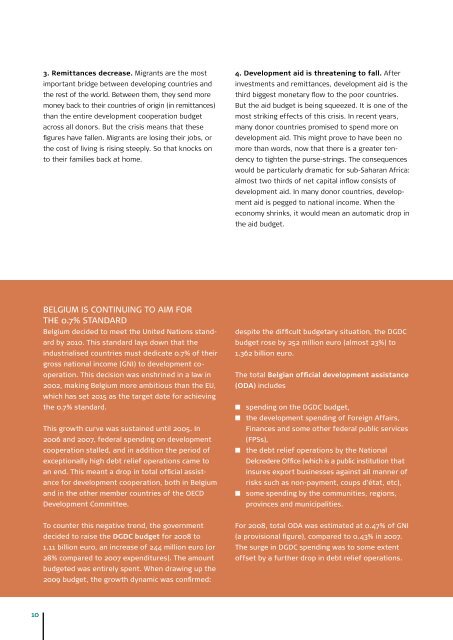DGDC Annual report 2008 - Buitenlandse Zaken - Belgium
DGDC Annual report 2008 - Buitenlandse Zaken - Belgium
DGDC Annual report 2008 - Buitenlandse Zaken - Belgium
You also want an ePaper? Increase the reach of your titles
YUMPU automatically turns print PDFs into web optimized ePapers that Google loves.
3. Remittances decrease. Migrants are the most<br />
important bridge between developing countries and<br />
the rest of the world. Between them, they send more<br />
money back to their countries of origin (in remittances)<br />
than the entire development cooperation budget<br />
across all donors. But the crisis means that these<br />
figures have fallen. Migrants are losing their jobs, or<br />
the cost of living is rising steeply. So that knocks on<br />
to their families back at home.<br />
4. Development aid is threatening to fall. After<br />
investments and remittances, development aid is the<br />
third biggest monetary flow to the poor countries.<br />
But the aid budget is being squeezed. It is one of the<br />
most striking effects of this crisis. In recent years,<br />
many donor countries promised to spend more on<br />
development aid. This might prove to have been no<br />
more than words, now that there is a greater tendency<br />
to tighten the purse-strings. The consequences<br />
would be particularly dramatic for sub-Saharan Africa:<br />
almost two thirds of net capital inflow consists of<br />
development aid. In many donor countries, development<br />
aid is pegged to national income. When the<br />
economy shrinks, it would mean an automatic drop in<br />
the aid budget.<br />
<strong>Belgium</strong> is continuing to aim for<br />
the 0.7% standard<br />
<strong>Belgium</strong> decided to meet the United Nations standard<br />
by 2010. This standard lays down that the<br />
industrialised countries must dedicate 0.7% of their<br />
gross national income (GNI) to development cooperation.<br />
This decision was enshrined in a law in<br />
2002, making <strong>Belgium</strong> more ambitious than the EU,<br />
which has set 2015 as the target date for achieving<br />
the 0.7% standard.<br />
This growth curve was sustained until 2005. In<br />
2006 and 2007, federal spending on development<br />
cooperation stalled, and in addition the period of<br />
exceptionally high debt relief operations came to<br />
an end. This meant a drop in total official assistance<br />
for development cooperation, both in <strong>Belgium</strong><br />
and in the other member countries of the OECD<br />
Development Committee.<br />
despite the difficult budgetary situation, the <strong>DGDC</strong><br />
budget rose by 252 million euro (almost 23%) to<br />
1.362 billion euro.<br />
The total Belgian official development assistance<br />
(ODA) includes<br />
■■ spending on the <strong>DGDC</strong> budget,<br />
■■ the development spending of Foreign Affairs,<br />
Finances and some other federal public services<br />
(FPSs),<br />
■■ the debt relief operations by the National<br />
Delcredere Office (which is a public institution that<br />
insures export businesses against all manner of<br />
risks such as non-payment, coups d’état, etc),<br />
■■ some spending by the communities, regions,<br />
provinces and municipalities.<br />
To counter this negative trend, the government<br />
decided to raise the <strong>DGDC</strong> budget for <strong>2008</strong> to<br />
1.11 billion euro, an increase of 244 million euro (or<br />
28% compared to 2007 expenditures). The amount<br />
budgeted was entirely spent. When drawing up the<br />
2009 budget, the growth dynamic was confirmed:<br />
For <strong>2008</strong>, total ODA was estimated at 0.47% of GNI<br />
(a provisional figure), compared to 0.43% in 2007.<br />
The surge in <strong>DGDC</strong> spending was to some extent<br />
offset by a further drop in debt relief operations.<br />
10
















